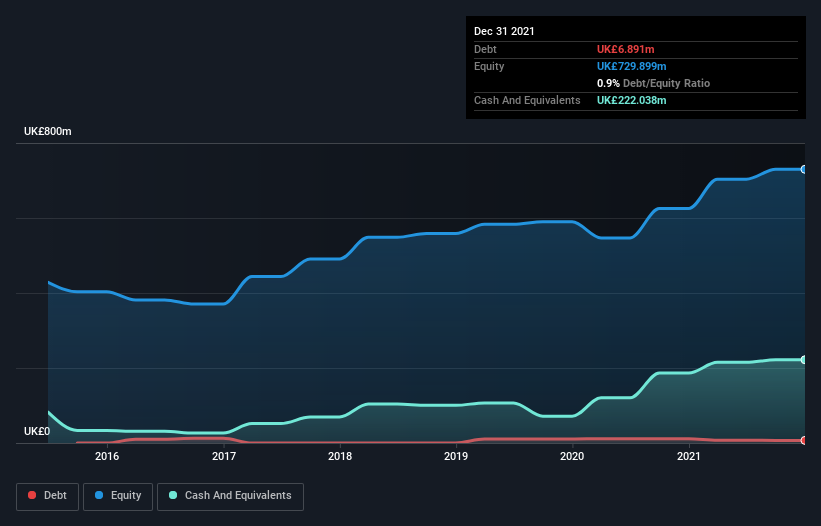Is Renishaw (LON:RSW) A Risky Investment?
Legendary fund manager Li Lu (who Charlie Munger backed) once said, 'The biggest investment risk is not the volatility of prices, but whether you will suffer a permanent loss of capital.' When we think about how risky a company is, we always like to look at its use of debt, since debt overload can lead to ruin. Importantly, Renishaw plc (LON:RSW) does carry debt. But is this debt a concern to shareholders?
Why Does Debt Bring Risk?
Debt assists a business until the business has trouble paying it off, either with new capital or with free cash flow. If things get really bad, the lenders can take control of the business. While that is not too common, we often do see indebted companies permanently diluting shareholders because lenders force them to raise capital at a distressed price. Of course, plenty of companies use debt to fund growth, without any negative consequences. The first thing to do when considering how much debt a business uses is to look at its cash and debt together.
Check out our latest analysis for Renishaw
What Is Renishaw's Net Debt?
The image below, which you can click on for greater detail, shows that Renishaw had debt of UK£6.89m at the end of December 2021, a reduction from UK£11.2m over a year. However, it does have UK£222.0m in cash offsetting this, leading to net cash of UK£215.1m.

How Healthy Is Renishaw's Balance Sheet?
The latest balance sheet data shows that Renishaw had liabilities of UK£102.9m due within a year, and liabilities of UK£48.4m falling due after that. Offsetting this, it had UK£222.0m in cash and UK£145.2m in receivables that were due within 12 months. So it can boast UK£215.9m more liquid assets than total liabilities.
This short term liquidity is a sign that Renishaw could probably pay off its debt with ease, as its balance sheet is far from stretched. Simply put, the fact that Renishaw has more cash than debt is arguably a good indication that it can manage its debt safely.
On top of that, Renishaw grew its EBIT by 70% over the last twelve months, and that growth will make it easier to handle its debt. There's no doubt that we learn most about debt from the balance sheet. But it is future earnings, more than anything, that will determine Renishaw's ability to maintain a healthy balance sheet going forward. So if you're focused on the future you can check out this free report showing analyst profit forecasts.
Finally, while the tax-man may adore accounting profits, lenders only accept cold hard cash. Renishaw may have net cash on the balance sheet, but it is still interesting to look at how well the business converts its earnings before interest and tax (EBIT) to free cash flow, because that will influence both its need for, and its capacity to manage debt. During the last three years, Renishaw produced sturdy free cash flow equating to 68% of its EBIT, about what we'd expect. This free cash flow puts the company in a good position to pay down debt, when appropriate.
Summing up
While we empathize with investors who find debt concerning, you should keep in mind that Renishaw has net cash of UK£215.1m, as well as more liquid assets than liabilities. And we liked the look of last year's 70% year-on-year EBIT growth. So is Renishaw's debt a risk? It doesn't seem so to us. Over time, share prices tend to follow earnings per share, so if you're interested in Renishaw, you may well want to click here to check an interactive graph of its earnings per share history.
If you're interested in investing in businesses that can grow profits without the burden of debt, then check out this free list of growing businesses that have net cash on the balance sheet.
New: AI Stock Screener & Alerts
Our new AI Stock Screener scans the market every day to uncover opportunities.
• Dividend Powerhouses (3%+ Yield)
• Undervalued Small Caps with Insider Buying
• High growth Tech and AI Companies
Or build your own from over 50 metrics.
Have feedback on this article? Concerned about the content? Get in touch with us directly. Alternatively, email editorial-team (at) simplywallst.com.
This article by Simply Wall St is general in nature. We provide commentary based on historical data and analyst forecasts only using an unbiased methodology and our articles are not intended to be financial advice. It does not constitute a recommendation to buy or sell any stock, and does not take account of your objectives, or your financial situation. We aim to bring you long-term focused analysis driven by fundamental data. Note that our analysis may not factor in the latest price-sensitive company announcements or qualitative material. Simply Wall St has no position in any stocks mentioned.
About LSE:RSW
Renishaw
An engineering and scientific technology company, designs, manufactures, distributes, sells, and services technological products and services, and analytical instruments and medical devices worldwide.
Flawless balance sheet average dividend payer.
Similar Companies
Market Insights
Community Narratives




